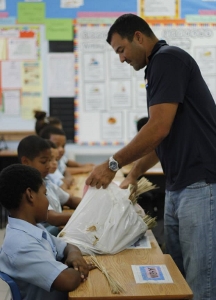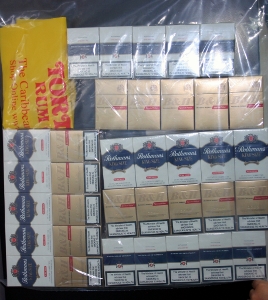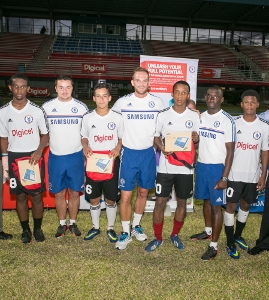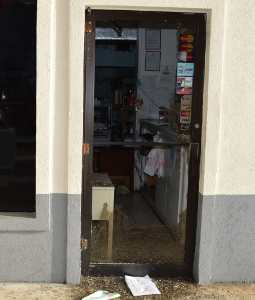Archive for May, 2014

Public urged to help ESO with household data update
 (CNS): The Economics and Statistics Office is asking the public to co-operate with its staff who will be going door to door over the next few months to update the Cayman Islands Household Register. The survey will begin on Monday May 26 and run for three months until 29 August. This is the first time since the 2010 Census that a full update of households will be conducted. Trained enumerators will visit every dwelling unit listed in the Census register, as well as newly constructed residential homes that are not already listed, to determine if they are occupied. Marco Archer, the minister of finance for economic development explained why the data is needed.
(CNS): The Economics and Statistics Office is asking the public to co-operate with its staff who will be going door to door over the next few months to update the Cayman Islands Household Register. The survey will begin on Monday May 26 and run for three months until 29 August. This is the first time since the 2010 Census that a full update of households will be conducted. Trained enumerators will visit every dwelling unit listed in the Census register, as well as newly constructed residential homes that are not already listed, to determine if they are occupied. Marco Archer, the minister of finance for economic development explained why the data is needed.
“It is important for policy makers to be informed from household statistics,” he said. “I am urging the public to cooperate with this statistical activity which will be the basis for selecting households for future surveys such as the labour force surveys.”
ESO officials said they will also be upgrading its data collection process through the use of tablets this time around as they asked for the continues cooperation from the community
“We thank them anew in advance for their support this year,”said ESO Director Maria Zingapan.
She added that ESO staff members will be carrying identification and she advised concerned community members to always ask for the field workers to present their IDs before providing key information.

First year of school heritage course heralded a success
 (CNS): Around 500 students in year six at government-run primary schools took part in a Heritage Arts Programme this year learning for the first time in school about Cayman’s marine heritage, silver thatch plaiting, Caymanian culinary arts traditional games and much more specific local history and culture. The final Heritage Arts tests were last week on the programme which is now completing its first full school year which the creator has heralded as a success. “It’s been a really successful year for us,” Chris Christian, the programme director said. “We’ve managed to cover a tremendous amount of ground, enhancing young people’s knowledge of Cayman’s rich and vibrant arts, culture and heritage through a variety of different means.”
(CNS): Around 500 students in year six at government-run primary schools took part in a Heritage Arts Programme this year learning for the first time in school about Cayman’s marine heritage, silver thatch plaiting, Caymanian culinary arts traditional games and much more specific local history and culture. The final Heritage Arts tests were last week on the programme which is now completing its first full school year which the creator has heralded as a success. “It’s been a really successful year for us,” Chris Christian, the programme director said. “We’ve managed to cover a tremendous amount of ground, enhancing young people’s knowledge of Cayman’s rich and vibrant arts, culture and heritage through a variety of different means.”
As well as the workbook, which he said had been a mine of information for both students and teachers the programme has included showcased artwork at The Ritz-Carlton, family fun days, mentoring of young students and o teacher’s workshops, helping educators themselves learn more about Caymanian culture.
Christian explained that the programme was specifically devised to teach Caymanian heritage in a contemporary setting, ensuring the contents of each lesson have been as interactive and relevant as possible. Lessons have also been designed to draw in other elements of the curriculum.
“When we teach the culinary arts we give the students the ingredients necessary to make whatever recipe it is we are studying so they can go home and make the dish with their family,” he advised. “Our workbook has the best recipe for cassava cake on the island,” he boasted.
Kite building, a favourite Caymanian pastime, involves looking at the engineering elements that go into making a kite fly, such as assessing its weight distribution and the length of its tail, Christian said.
The programme is supported by three separate government ministries, the Ministry of Education, Employment and Gender Affairs, the Ministry of Administration, Tourism and Transport and the Ministry of Health, Sports and Youth and Culture. Tara Rivers, the education minister described the programme, as an exciting and useful addition to the school curriculum.
“The Heritage Arts Programme offers an important opportunity for young people to learn about and experience our traditional Caymanian heritage and culture through arts and crafts. It’s essential that we continue to offer such educational programmes in an effort to preserve and promote an understanding and appreciation of our cultural heritage for future generations,” she said.
For more information please visit https://www.facebook.com/pages/CTA-Cayman-Traditional-Arts/145070528867373

Numeracy focus in schools
 (CNS): Improving the standard of mathematics throughout government schools is a long slow process and entails a complete shift in the way that the subject is taught so that students connect maths to real life situations, according to the Education Ministry’s numeracy specialist, Frank Eade. The first step in tackling a recognized problem across the whole system is to re-train the teachers to teach maths in a less prescriptive way and to focus on visualization methods so that children get a real concept of numbers instead of seeing them as just marks on a page. This ongoing effort has already resulted in dramatic improvements in the primary students’ attainment levels since 2011, with a clear drop in the percentage of students in the lower attainment levels and a corresponding rise in students reaching the upper levels.
(CNS): Improving the standard of mathematics throughout government schools is a long slow process and entails a complete shift in the way that the subject is taught so that students connect maths to real life situations, according to the Education Ministry’s numeracy specialist, Frank Eade. The first step in tackling a recognized problem across the whole system is to re-train the teachers to teach maths in a less prescriptive way and to focus on visualization methods so that children get a real concept of numbers instead of seeing them as just marks on a page. This ongoing effort has already resulted in dramatic improvements in the primary students’ attainment levels since 2011, with a clear drop in the percentage of students in the lower attainment levels and a corresponding rise in students reaching the upper levels.
Student results in the public domain are widely misunderstood, Eade told CNS. The Cayman Islands has adopted the UK assessment process of attainment levels – though not, he stressed, the method of teaching. There are 8 levels and the target is for at least 50% of students to reach Level 4 by the end of Year 6. While everyone would like all children to be reaching Level 4 or above by that stage, that is not a reasonable expected result in any country, he explained.
Eade said that when he arrived two and half years ago in 2011 the percentage of students at Key Stage 2 (end of Year 6) who were at Level 2 or below in maths was 23%. In 2013, this had dropped to 13%. Correspondingly, the percentage of students at Level 4 or above has increased from 25% in 2011 to 40% just two years later in 2013.
In the UK around 80% of the children are – on paper – reaching Level 4 in maths by the end of primary school, but Eade said that the immense pressure on schools and teachers in Britain to improve statistics had warped the results, which have been achieved through a ‘production line’ mentality.
“In the UK Year 6 has become a revision factory,” he said. “The results are a bit of an illusion and no longer a true reflection of the students’ attainment levels.” Many secondary schools in the UK no longer use the assessment levels to gauge new Year 7 students’ abilities and give them CAT tests instead, he explained. “When you look at the international tables, which focus on problem solving, England has not improved at all in the last 10 or 15 years. So we have to be careful about how we look at the data.”
Countries that do very well on international tables, such as Singapore and Japan, teach maths in a very similar way to the methods now being introduced in Cayman schools.
The Cayman Islands Ministry of Education’s goal, he said, is to avoid the false results of the UK and to achieve real improvements in maths that will enable students to continue to implement what they have learned beyond school, in their lives and in their jobs, and for somethough higher learning. Not gaining a firm grasp of maths at primary level can later become an impediment for even the more academic students who go on to study such subjects as engineering, science, finance and economics, as well as mathematics itself, at university.
“Mathematics is rather peculiar subject. What you want students to do is tobe able to solve problems that are mathematical but also about the world around them, but it is often taught in a very prescriptive way and the children end up not being comfortable with it and not being good problem solvers,” Eade explained. “Not being able to use mathematics to solve problems in everyday situations is because of the way mathematics is taught. Generally, in most countries, it is a set of rules handed down by the teacher and the children are taught to go through the motions without really thinking about it all.”
To illustrate, he gave a typical fraction problem: three sandwiches to divide between four children. Students who have not been taught effectively will not immediately work out that each child will get three quarters of a sandwich each.
“What they may do instead is to cut two of them in half, so each child now has half a sandwich, then cut the last one into four. So then they each have a half plus a quarter. But they may still not realise that they each have three quarters of a sandwich. Other kids may cut each sandwich into four and then work out that they each have one quarter from each of the three sandwiches.
“But my concern as the teacher is that they haven't used their knowledge of fractions at all, so the knowledge of mathematics has not been transferred to a real situation. They're not looking at those sandwiches and saying that's 3÷4, which is three quarters. It's a disconnect between what they are learning and how to apply it,” he said.
“When I started teaching, I was shocked because I would teach the children mathematics but they could not apply it into word problems. It was as if it was two completely different worlds – and that's the big issue for teachers: how to connect these two worlds.”
Eade explained that he has implemented a ‘Leaders in Primary Maths’ program, where each school has either one or two teachers that he has trained in mathematics education, to understand the mathematics curriculum and how to teach it in the primary school. Those maths leaders are now supporting other teachers in their schools and working with them in the classroom. Eade has also created units in each year group across the system.
“Primary school teachers are generalists, not specialists, and they are quite often teaching a curriculum that they don't fully understand,” he said. Before these initiatives were implemented, some teachers lacked confidence in the mathematics they taught, but this is changing, he stressed.
The primary focus for the last two years has been Years 1 through Year 6 and there is now a far greater emphasis on visualization in the teaching of maths. An example of this is the numbers on dice.
“People naturally recognise them as groups of numbers instead of counting each dot. In the primary schools, when I show kids two groups of five like the numbers on the dice, I want them to know that is 10 and not have to count 1, 2, 3 … up to 10. If I show a student a number line, 1 up to 100, and ask them where 50 is, I want them to know that is in the middle rather than count up to 50, which is what was happening.”
For the students that need particular help, 42 teachers so far, including five from the secondary system, have been given a 10-day training course to do remedial work in a ‘Maths Recovery’ programme, which is largely sponsored by the Cayman Islands Society of Professional Accountants (CISPA).
“It's much easier if the child is taught properly from the word go, but it is possibleto catch up. However, the older they are the harder it is, and that's why catching problems early is important,” Eade noted.
“My experience is that the teachers here work very hard and it is not helpful to blame them; it's just the way that they were taught to teach,” he said, noting that the teachers have been very receptive to the changes he is making. One thing they have to learn to do, Eade said, is to hold back and get the students to talk through what they are doing.
For the next generation of educators, Eade and two other teachers from the Cayman system are lecturing at the University College of the Cayman Islands as part of its teacher training course.
“The problems are not going to change overnight,” he said. “When I arrived, I explained that this was going to be a very long term project. There is a general agreement that there needs to be some continuity and that what is happening is the right thing. It’s important that the process does not keep getting de-railed,” Eade said. “There are still problems but it is getting better.”

Dart booze plan brews concern with local producers
(CNS Business): Cayman’s only distillery, which produces niche local liquor products, is not the only local voice raising concerns about Dart’s plans to open a distillery at its Cayman Distributor’s warehouse in George Town. The local brewery has also added its concerns about the islands' largest investor and biggest corporate entity entering the production market as they fear Dart has the power to push everyone else from the liquor market. The Cayman Spirits Company said they were worried that allowing Dart to add a distillery to its list of significant booze interest would undermine rather than fuel competition and the Cayman Islands Brewery said it feared that it would push the new specialist distillery out of business. Read more on CNS business

CIG settles with ousted bosses
 (CNS): After more than five years on paid leave, the former chief officer in the health ministry, Diane Montoya, and the deputy financial secretary in Financial Services, Deborah Drummond, have been offered a deal by the Cayman Islands Government. The amount of the settlements, despite coming out of the public purse, remains under wraps but both women received a lump sum which equates to the annual salaries they would have earned until their retirement at 60 had they stayed in the service as well as some legal costs. Neither women were ever accused of any wrongdoing but were maneuvered out of their top public sector jobs when the UDP administration, led by McKeeva Bush, reorganized the ministries following the 2009 election victory.
(CNS): After more than five years on paid leave, the former chief officer in the health ministry, Diane Montoya, and the deputy financial secretary in Financial Services, Deborah Drummond, have been offered a deal by the Cayman Islands Government. The amount of the settlements, despite coming out of the public purse, remains under wraps but both women received a lump sum which equates to the annual salaries they would have earned until their retirement at 60 had they stayed in the service as well as some legal costs. Neither women were ever accused of any wrongdoing but were maneuvered out of their top public sector jobs when the UDP administration, led by McKeeva Bush, reorganized the ministries following the 2009 election victory.
In a statement from the deputy governor’s office on Wednesday, officials said that the agreements came following “protracted negotiations” but the government had amicably settled the women’s clams. Under the terms of a confidential agreement, they will officially retire from the civil service, on 1 July.
“The financial terms of the settlement reflect government’s legal obligation to compensate the officers for the loss of salary between their early retirement date and their normal retirement date upon their attaining age 60. A sum will also be paid as a contribution toward their joint legal fees. The officers will receive their normal pension entitlements appropriate to their 2014 retirement date,” Deputy Governor Franz Manderson said in the statement.
He also described the officers' departure as a loss for the service.
"At no time has any allegation of wrongdoing been made against the officers, despite their having been put on required leavedating back to 2009. In the face of this difficult situation, the officers have conducted themselves with the utmost professionalism and have, throughout the arduous process, demonstrated respect for the offices they held and the people and government they have collectively served for more than 60 years,” Manderson added.
Given that both women were commanding top six figure salaries as Grade C public servants, the cost to the public purse is likely to be more than $3 million because when the women were placed on required leave in 2009, they were only in their forties and many years away from the civil service retirement age.
Graham Hampson, who represented the two officers, emphasised that his clients were, in light of the all the facts and especially their many years of unblemished service with distinction to the Cayman Islands, entitled to personal privacy in relation to the details of the resolution of the matter, hence the confidential nature of the agreement. He thanked the government for recognizing and respecting this fundamental right.
No reasons were ever formally given for sending the two senior civil servants home. The deputy governor at the time, Donovan Ebanks, said they had done nothing wrong and were awaiting a decision to place them in new roles, but no new jobs were ever forthcoming.
After the women had been on leave for some five years, Manderson said at the UCCI conference that such a situation would not be allowed to happen ever again.
He noted that there was a difference between a reshuffle of the ministries, which he said most new governments do, and just sending senior civil servants home. In this instance, when the Bush administration realigned the ministries things went much further than a reshuffle, with Drummond, Montoya and the former education ministry’s chief officer, Angela Martins, all being sent on required leave. Martins, however, retired in 2011.

Cigarette smugglers arrested
 (CNS): Two women and one man have been arrested and are expected to be charged with related offences in connection with a cigarette smuggling ring that HM customs officials targeted earlier this month. Officers conducted specific targeted operations during the first two weeks in May at the Owen Roberts International Airport dealing with custom duty evasion and smuggling. One three-day operation resulted in the arrest of three people, two of whom are airline employees, and the seizure of several cartons of duty free cigarettes intended for the local black market. Collector of Customs Samantha Bennett said that the department was aware of a growing trend of smuggling involving duty-free cigarettes and has identified the varying techniques used.
(CNS): Two women and one man have been arrested and are expected to be charged with related offences in connection with a cigarette smuggling ring that HM customs officials targeted earlier this month. Officers conducted specific targeted operations during the first two weeks in May at the Owen Roberts International Airport dealing with custom duty evasion and smuggling. One three-day operation resulted in the arrest of three people, two of whom are airline employees, and the seizure of several cartons of duty free cigarettes intended for the local black market. Collector of Customs Samantha Bennett said that the department was aware of a growing trend of smuggling involving duty-free cigarettes and has identified the varying techniques used.
“Thesecigarettes will eventually end up on the black market, but we will make every effort to stop those criminals who seek to make money from smuggling of goods, whether the goods are legal or illegal,” Bennett added.
Initially in this particular operation a 21-year-old woman and a 26-year-old man, both believed to be employed by airlines, were arrested. Then, as the operation continued into the week, another 35-year-old woman was arrested upon her arrival in the Cayman Islands. All three are now on bail while investigations are continuing but officials were expecting to bring charges in the case.
Anyone with Information relating to this type of crime is asked to contact HM Customs’ tip-line on 1-800-534-8477 or CrimeStoppers on 800-8477 (TIPS).

Cayman Rugby squad preps for major games
(CNS): Following its recent impressive performance with a 35 to 7 win against local rivals Bahamas earlier this month, the Cayman rugby squad travels to Bermuda on 7 June for Round 1 of the NACRA tournament before hosting USA South here on 14 June. The Bahmas win moved the team up to 58th place in the International Rugby Boards world rankings. If Cayman win both games they will go onto play the top seeded team from the South to decide who wins the 2014 NACRA regional tournament. Interactive ticketing for the Big Game 4 V USA South will go live on www.caymanrugby.com on Thursday 22 May at 8am.
Tickets are $15 adults and $7 children under 12 if pre purchased through the site or $25 on the door. Cayman hosts the 2013 NACRA champion USA South for the first time and the game is expected to be the best Big Game yet.
For more details see flyer below

Promising young soccer stars to train with Chelsea FC
 (CNS): A coach for the footballing giant Chelsea FC, had great things to say about Cayman’s young players following a soccer clinic which took place in Cayman last week. The senior international development officer for the Chelsea FC Foundation, David Monk, praised the high quality of footballing talent he saw at the Kick Start Clinics sponsored by Digicel and held at the Truman Bodden Sports Complex. Zachary Scott, Tevin Crawford and Kameron D’hue were the three youngsterspicked to go to the Digicel Academy in October which takes place in Barbados where they will train with coaches from the famous football club.
(CNS): A coach for the footballing giant Chelsea FC, had great things to say about Cayman’s young players following a soccer clinic which took place in Cayman last week. The senior international development officer for the Chelsea FC Foundation, David Monk, praised the high quality of footballing talent he saw at the Kick Start Clinics sponsored by Digicel and held at the Truman Bodden Sports Complex. Zachary Scott, Tevin Crawford and Kameron D’hue were the three youngsterspicked to go to the Digicel Academy in October which takes place in Barbados where they will train with coaches from the famous football club.
“With our visit being the first of its kind to Cayman, we were excited to see exactly what these Caymanian players had to offer,” said Monk. “After day one, we concluded that the attitude and professionalism demonstrated by these young men was admirable, this partnered with a high ability level means that we must adopt high expectations for our next visit.”
The Cayman Islands was the fourth stop on the 14 country tour which will see Monk and his team of coaches training the Caribbean and Central American region’s best young players. This was the first year the Cayman Islands took part in the clinics which included increased training time with the boys as well as an under-16 girls training session.
On Thursday, 15 May the first three players to represent the Cayman Islands at the academy later this year were selected. Scott, Crawford and D’hue were picked from thirty of the top local players while Jiffon Robinson was selected as the ‘Wild Card’ and dubbed fastest footballer in the Cayman Islands.
There will be a wild card player selected from each of the 14 participating countries and three of those will go on to attend the Digicel Academy by winning a spot based on fan votes and Digicel Cayman promises to promote the initiative heavily when voting opens in July to get Jiffon on his way.
Minister of Health, Sports, Youth and Culture Osbourne Bodden said bringing Chelsea FC to Cayman for the first time had boosted the profile of the camp. “I'm hoping that the three Chelsea coaches will have a major impact on our youngsters, male and female, and also on our local coaches. Chelsea is one of the world's largest clubs in the world and they have a lot to share. I'm hoping this will become a permanent fixture on our sporting calendar,” he said.
Meanwhile, local Digicel boss Raul Nicholson-Coe explained whatthe football camps were all about.
“The Digicel Kick Start Clinics provide the ideal vehicle to ensure that the kids with the athletic abilities are provided with a platform to showcase their skills and to be given opportunities to develop not only their athletic abilities, but to also be given the necessary life skills related to commitment and professionalism that will allow them to be successful in whatever career path that they chose,” he said.
The Digicel Kick Start Clinics provide thousands of aspiring young footballers from across 14 countries in the region to try out for their chance to travel to the Digicel Academy in Barbados and train under top coaches from Barclays Premier League side, Chelsea FC. For more information please visit www.digicelfootball.com

Burglars steal cigarettes from Brac gas station
 (CNS): Police on Cayman Brac are looking for witnesses who may have information regarding an overnight break-in at the West End Gas Station. CI Frank Owens said his officers were at the scene this morning where the burglars broke in by smashing the glass in the front door and stole a quantity of cigarettes. Anyone who may have been in the vicinity of the gas station last night or early this morning who may have heard or seen anything suspicious or have any information in relation to the incident is asked to contact Chief Inspector Frank Owens on 516-6100 or at the Cayman Brac Police Station on 949-0331 or Crime Stoppers on 1 800-8477 (TIPS).
(CNS): Police on Cayman Brac are looking for witnesses who may have information regarding an overnight break-in at the West End Gas Station. CI Frank Owens said his officers were at the scene this morning where the burglars broke in by smashing the glass in the front door and stole a quantity of cigarettes. Anyone who may have been in the vicinity of the gas station last night or early this morning who may have heard or seen anything suspicious or have any information in relation to the incident is asked to contact Chief Inspector Frank Owens on 516-6100 or at the Cayman Brac Police Station on 949-0331 or Crime Stoppers on 1 800-8477 (TIPS).

Maples Rvs, Steppingstones too strong for opponents
(CRFU): The semi-finals of the National Touch Rugby Championships 2014 were played out against a backdrop of searing heat at the South Sound Rugby Club last weekend.
First up saw tournament favourites Maples Reserves take on Island Air. At this level, touch rugby is not the pastime of a few ex-rugby players looking for a runaround but rather a fast-paced, well-drilled game where adherence to a structured game plan is essential. And none come better drilled than Maples Reserves. Captain Adam Huckle may appear amiable and avuncular on the surface but let that not fool you for inside there is a man with a rabid appetite for the win.
His team has been training all season and so when Andrew “John” West scored after 30 seconds from the kick-off there was a palpable and ominous feeling that this was going to be a long afternoon for the Island Air team. A quick second by Australian Ian Smith (no, not that one who plays Harold Bishop in “Neighbours”!) confirmed their early dominance and for a while it looked like Island Air might go into a tailspin. Chandra Friesen managed to grab one back for the ‘Air after a nice dummy break by the buffed and blond Neal Ainscow, but it was lean cuisine for the team in black.
Maples Reserves pose a threat right across the team whether it be the lightning speed and Riverdance-like feet of Nicky Keogh; the circa 1957 Elvis hip swivel of Neil Montgomery; the languid low-rider running style of Jyoti Choi or the Highland Terrier-like scampering of Andrew “Westie” West. Tries came at regular intervals but none more significant or controversial than the ‘Reserves fourth try, where Choi, having collided with Island Air’s Sheila Crosby and taking her completely out of the game, then exploited the defensive gap caused by her being prostrate on the floor to eventually score himself.
It was an unusual occurrence and although unintended was significant none the less. Referees Henshaw and Shelver debated long and hard and eventually the try was given. More than one eyebrow was raised in the stands at that decision. A half-time score of 7-3 paid tribute to the tenacity of Island Air and Neal Ainscow in particular but the crowd felt the writing was on the wall. It did not make good reading for Island Air.
The second half became a procession with tries for Dan “Des” O’Connor (3), Wiki “Pedia” Hitchman (2), and Elvis Montgomery. By the end, Island Air were more lost than Flight 370 and I doubt even the full resources of CNN and their myriad of search-and-rescue analysts and experts could locate their chances of winning this one. Final score 14-4 to Maples Reserves.
The second semi-final saw SteppingStones take on Heineken Brew Crew. A quick glimpse at the team sheets showed this to be a game of seasoned Touch players full of guile and nouse (SteppingStones) against a team dependent on youthful vigour, pace and energy brought to it by its band of inexperienced by highly skilled National Rugby players (Heineken Brew Crew). Therefore it was a shocking blow to the ‘Crew when five players were withdrawn from their roster due to National Squad commitments, leaving an average age approaching 40.
Stripped of all their most potent weapons they were like a gunslinger going to a stand-off with rolled-up newspaper. They might make a make a couple of hits if they could get close enough but hardly deadly. And yet it was Heineken who scored first. Steve “the Baker” Henshaw crossed the whitewash in the first minute and briefly (well for just two minutes) Brew Crew dared to dream. However, that dream soon turned to a nightmare as Scott McCarty (3), Simon Raftopolous (4), Morgan Shelver (3), Rudolf Weder, Shaun McDermot and Emily Davies racked up the tries. Time and again SteppingStones would break through the aging defensive line on halfway and with no speed in the chasers they would canter on to score at a trot. If it was a boxing match the referee would have stopped it as Heineken were taking metaphorical punch after punch. They were beaten and at times looked broken. Final score 13-2.
The final game saw a 5th and 6th place play-off between Maples and KPMG. Both teams have struggled this year through either a lack of experience, players or general fitness against the bigger guns in the League.
Maples have looked good in parts this season and they probably saved their best for this game winning by 11 tries to 1. The try of the game, indeed the try of the day was scored by their dynamic strike runner Nino Dilbert. He had been having a good game running in four excellent scores from nice offloads but his individual try in the second half was something to behold – literally poetry in motion. Picking the ball up just over halfway he span, toe-looped, salchow-ed and axel-ed his way through a KPMG defence left to clutch at the thinnest of straws.
It was mesmerizing stuff and his own team just stood in awe and wonder as he pirouetted through to score a magnificent try. Ably supported with scores by Michelle Bailey (2), and Finn O’Hegarty (2), Paul “Barrel” Johnson and Ruan Van “Rental” Vuuren it proved all too much for KPMG. They never gave up though and a consolation score for Mark Bakker was well deserved.